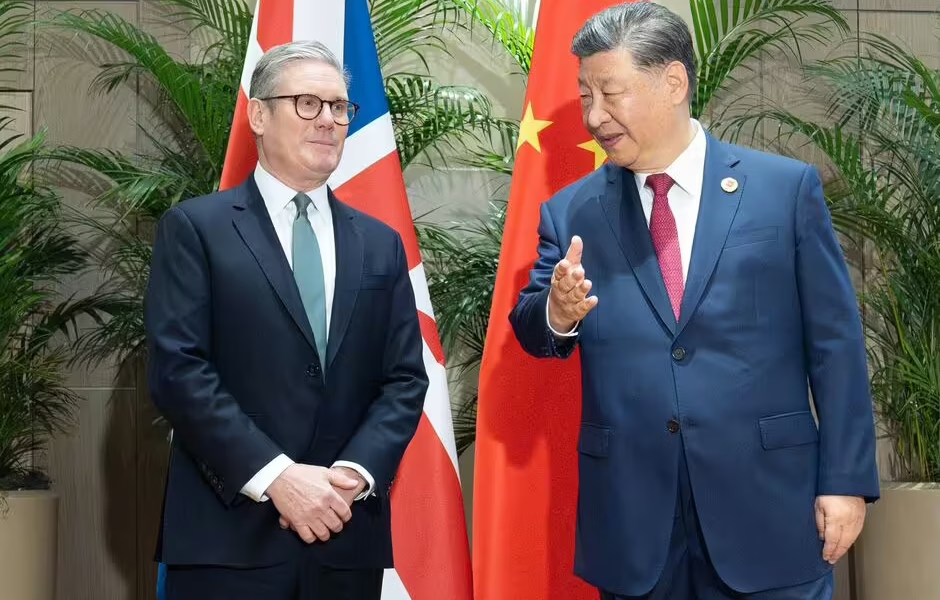
Labour’s relationship with China is being hammered (Image: Getty)
Foreign Secretary Yvette Cooper admitted China was a threat to national security – but refused to label Beijing a “friend or foe”. Ms Cooper, who as home secretary up until September 5 had oversight of MI5, said she was “deeply frustrated” about a case against two suspected spies collapsing.
But Labour has been accused of prioritising economic ties with Beijing over national security. And on Friday, leading China hawk Luke de Pulford claimed national security adviser Jonathan Powell had become an “unofficial China tsar, bossing the FCDO [Foreign, Commonwealth and Development Office] approach”. Because Mr Powell was a political appointee, many in Westminster are increasingly of the view that Prime Minister Sir Keir Starmer should be held responsible for his decisions.
The cases against Christopher Cash, a former parliamentary researcher, and 33-year-old Christopher Berry, a teacher, collapsed because Labour did not designate China a “threat”.
Labour was also accused of failing to pass on a dossier of evidence from the security services over Chinese espionage activities in the UK, it is understood.
It also included evidence of Chinese hacking attempts and efforts to build secret police stations to spy on dissidents.
Some believe this would have been enough to convince a jury that China was a threat.
Ms Cooper told BBC Radio 4’s Today programme: “Let me be clear that we know China poses threats to UK national security from things like transnational repression and espionage to hostile cyber activity as well, and we have said so.
“And they also, of course, are a trading partner and they are a crucial partner in the process for example on tackling climate change. But I am deeply frustrated about this case because I, of course, wanted to see it prosecuted.”
Ms Cooper repeated an assurance given by Sir Keir this week that ministers had not been involved in any of the evidence that was put to the Crown Prosecution Service (CPS).
She added: “As the Prime Minister has set out, this was also about not just the law that was in place at the time of the offences, but also the Government’s stance that was in place at the time of the offences. And it’s not for us to say in retrospect what that should have been.
“So look, let’s be really clear, the activity that was alleged in this case absolutely should be illegal and should face prosecution, and that is why we supported changing the law since then, which makes it easier to prosecute cases like this.”
The case against 30-year-old Mr Cash and Mr Berry was dropped in early September.
Mr Cash and Mr Berry were charged by the CPS in April last year with spying under the Official Secrets Act 1911, when they were accused of collecting and communicating information that could be “useful to an enemy”.
Both denied the charges.
The Prime Minister has maintained that the last Conservative administration had not designated China as a threat to national security, so his Government could not provide evidence to that effect, which the director of public prosecutions Stephen Parkinson said was required to meet the threshold for prosecution.
Mr Parkinson said the CPS had tried “over many months” to gather material from ministers, but it had not been forthcoming.

Keir Starmer is under pressure to sack Jonathan Powell (Image: Getty)
Shadow Home Secretary Chris Philp, who was a Home Office minister between October 2022 and July 2024, said the UK had multiple documents and reports detailing the threat Beijing poses.
He said: “The Government has multiple internal documents and reports on the threat China posed to national security in the 2021-23 period. I have spoken to colleagues who served as relevant ministers then, and they have told me these documents exist … Starmer’s Government could have disclosed these documents to the CPS, in private if needed.
“But it chose not to. It instead destroyed the prosecution by refusing to provide the evidence the CPS needed – evidence the Government clearly has in its possession.”
Chinese state-backed hackers targeted the Electoral Commission and accessed the voting records of 40 million people from August 2021. The breach was not identified until more than a year later.
China was also blamed for hacking the Ministry of Defence in May 2024, with hackers gaining access to payroll information including bank details, names and addresses.
Ms Cooper refused to be drawn on whether China was “a friend or a foe”.
She said: “Where there are national security threats, we need to take them immensely seriously and respond to them, and we continue to do that.”
A government spokesman said: “Keeping Britain safe continues to be our first priority. We are meeting the sophisticated and persistent challenge China poses to the UK, co-operating where we can and challenging where we must, always protecting our national security.”




